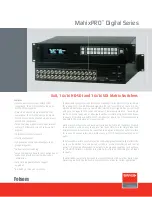
S
IMPLE
N
ETWORK
M
ANAGEMENT
P
ROTOCOL
3-47
Specifying Trap Managers and Trap Types
Traps indicating status changes are issued by the switch to specified trap
managers. You must specify trap managers so that key events are reported
by this switch to your management station (using network management
platforms such as SMC EliteView). You can specify up to five
management stations that will receive authentication failure messages and
other notification messages from the switch.
Command Usage
• If you specify an SNMP Version 3 host, then the “Trap Manager
Community String” is interpreted as an SNMP user name. If you use V3
authentication or encryption options (authNoPriv or authPriv), the user
name must first be defined in the SNMPv3 Users page (page 3-52).
Otherwise, the authentication password and/or privacy password will
not exist, and the switch will not authorize SNMP access for the host.
However, if you specify a V3 host with the no authentication (noAuth)
option, an SNMP user account will be automatically generated, and the
switch will authorize SNMP access for the host.
• Notifications are issued by the switch as trap messages by default. The
recipient of a trap message does not send a response to the switch. Traps
are therefore not as reliable as inform messages, which include a request
for acknowledgement of receipt. Informs can be used to ensure that
critical information is received by the host. However, note that informs
consume more system resources because they must be kept in memory
until a response is received. Informs also add to network traffic. You
should consider these effects when deciding whether to issue
notifications as traps or informs.
To send an inform to a SNMPv2c host, complete these steps:
1. Enable the SNMP agent (page 3-45).
2. Enable trap informs as described in the following pages.
3. Create a view with the required notification messages (page 3-63).
4. Create a group that includes the required notify view (page 3-58).
To send an inform to a SNMPv3 host, complete these steps:
1. Enable the SNMP agent (page 3-45).
2. Enable trap informs as described in the following pages.
Summary of Contents for 8728L2 - annexe 1
Page 2: ......
Page 15: ...CONTENTS xi ...
Page 19: ...TABLES xv ...
Page 32: ...INTRODUCTION 1 10 ...
Page 46: ...INITIAL CONFIGURATION 2 14 ...
Page 177: ...PORT CONFIGURATION 3 131 Figure 3 59 Displaying Etherlike and RMON Statistics ...
Page 258: ...CONFIGURING THE SWITCH 3 212 ...
Page 524: ...COMMAND LINE INTERFACE 4 266 ...
Page 532: ...TROUBLESHOOTING B 4 ...
Page 545: ......
















































